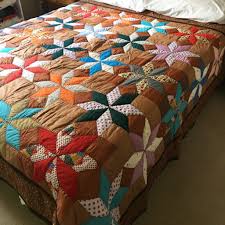Unravelling the Mysteries of Quilts: Answering the 6 Most Commonly Asked Questions

Quilts are a unique and beautiful form of art that has been around for centuries. They are made from pieces of fabric sewn together to create intricate patterns and designs. Quilts are often used as bedding, but they can also be hung on walls or draped over furniture for a decorative touch.
Quilts have a rich history in many cultures. In Europe, quilting was first seen in the Middle Ages, when people sewed scraps of fabric together to make warm blankets for their homes. In the United States, quilting became popular during the 19th century and was used as a way to commemorate special events or people. Quilts were also used to represent family heritage or tell stories through their intricate patterns and designs.
Today, quilts are still popular and can be seen in many different forms. From traditional patchwork quilts to modern art quilts, there is something for everyone’s taste. Quilters often use traditional fabrics like cotton and wool, but they also use modern fabrics like polyester and rayon to create unique designs.
The process of making a quilt is both time-consuming and rewarding. It requires skill and patience to cut the fabric into precise pieces and sew them together into a cohesive design. Quilters often use templates or patterns to guide them in creating their masterpieces, but some prefer to make their own designs from scratch.
Quilting is an art form that will never go out of style. Whether you’re looking for something cozy to snuggle under or an eye-catching piece of wall art, there’s sure to be a quilt that fits your needs!
What are the 6 most commonly asked questions about quilts?
- What is the best way to care for a quilt?
- How do I choose the right quilt for my bed?
- What type of fabric should I use for a quilt?
- How do I make a patchwork quilt?
- What are the different types of quilting stitches?
- How can I tell if a quilt is handmade or machine-made?
What is the best way to care for a quilt?
The best way to care for a quilt is to keep it away from direct sunlight, moisture, and extreme temperatures. Regularly vacuum or air out the quilt to remove dust and dirt. If necessary, gently hand wash the quilt in cool water with a mild detergent and lay flat to dry. Store the quilt in a cool, dry place away from direct sunlight or extreme temperatures.
How do I choose the right quilt for my bed?
- Start by determining the size of your bed. Measure the width and length of your mattress, and then add an extra 15-20 inches to account for the drop of your quilt.
- Consider the material of your quilt. Quilts are typically made from cotton, polyester, wool or silk. Consider which material will be most comfortable for you and fit into your budget.
- Think about the style you prefer for your bedroom decor. Do you like a more traditional or modern look? Are there certain colors or patterns that you like?
- Consider any special features that may be important to you, such as machine washable fabrics or hypoallergenic materials.
- Lastly, check customer reviews to make sure that the quilt is good quality and meets your expectations before making a purchase.
What type of fabric should I use for a quilt?
The type of fabric you use for a quilt depends on the look you are trying to achieve. Common fabrics used for quilting include cotton, flannel, and wool. You can also use synthetic fabrics such as polyester or nylon. Each type of fabric has its own unique characteristics that will affect the look and feel of your quilt.
How do I make a patchwork quilt?
- Gather your supplies: fabric, batting, thread, sewing machine, iron and ironing board, rotary cutter and cutting mat.
- Choose a pattern or design for your quilt top. It can be a traditional patchwork quilt or something more modern.
- Cut your fabric into the necessary pieces for the quilt top according to the pattern or design you chose.
- Lay out the pieces of fabric on a flat surface in the order that they will be sewn together to create the quilt top.
- Sew together the pieces of fabric to create the quilt top using a 1/4 inch seam allowance and backstitching at each end of each seam line.
- Press all seams open with an iron and then baste all layers together with safety pins or basting spray if desired.
- Quilt as desired using either hand-quilting or machine-quilting techniques (or both).
- Trim any excess batting and backing fabric from around the edges of the quilt top with scissors or rotary cutter and ruler to make sure all edges are even and straight before binding it together with bias tape or other binding material of your choice (see link below for tutorial on how to bind a quilt).
- Wash your finished quilt in cold water on a gentle cycle using mild detergent to help set all seams and give it that “lived-in” look!
What are the different types of quilting stitches?
The different types of quilting stitches include straight stitch, satin stitch, running stitch, cross stitch, feather stitch, cable stitch, echo quilting, stippling, and free-motion quilting.
How can I tell if a quilt is handmade or machine-made?
The best way to tell if a quilt is handmade or machine-made is to look at the stitching. Handmade quilts usually have small, even stitches that are usually uniform in size. Machine-made quilts tend to have larger, less even stitches that may vary in size. Additionally, handmade quilts often have a more intricate pattern or design than machine-made quilts.
Leave a Reply